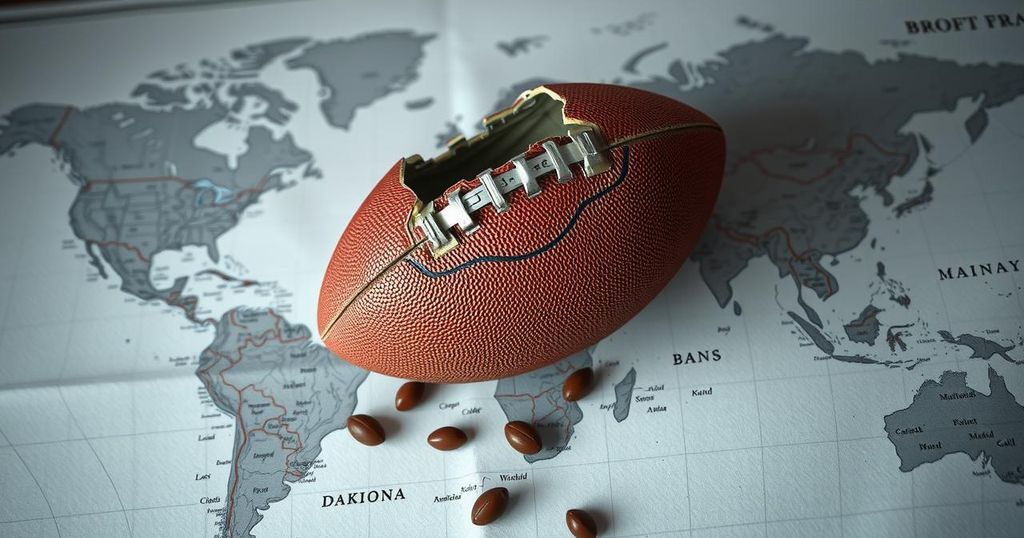International Football Bans: Russia, Israel, and the Intersection of Politics and Sport

Russia remains suspended from FIFA due to the Ukrainian conflict, with the Palestine Football Association advocating for a similar suspension for Israel. FIFA and Uefa face pressure about these political issues amid their governing operations. The notable complexities of how international suspensions operate arise from broader geopolitical dynamics, revealing the intersection of sport and politics in global football governance.
As Russia remains suspended from FIFA due to the invasion of Ukraine, the Palestine Football Association has proposed a similar suspension of Israel, which adds a political layer to the ongoing discussions in international football. The upcoming Uefa Congress in Belgrade might seem uneventful, but the corridors will likely buzz with these contentious topics.
Pressure is mounting within FIFA and Uefa to reintegrate Russia into international competitions, as some influential figures argue that the initial ban was unnecessary. The request highlights a deeper political issue, where the conversation around international suspensions can often become convoluted.
In the backdrop, the Palestinian Football Association has garnered support from the Asian Football Confederation, citing the losses they’ve faced due to the conflict. They report that 92 Palestinian players have died, and their national team is forced to play qualifiers abroad, as local football infrastructure is in ruins. Human Rights Watch has also intervened, urging FIFA to address issues pertaining to football activities conducted in settlements considered illegal under international law.
FIFA has been criticized for postponing decisions related to Israel, which has fueled protests worldwide calling for accountability. These demonstrations emphasize the complexities that come with political stances in sports, particularly with global governing bodies reluctant to issue suspensions without robust justifications.
The initial suspension of Russia was not motivated by moral considerations but by logistical necessities; multiple European football associations refused to play against them, creating a crisis for FIFA that demanded immediate action to preserve the integrity of competition.
Fifa does not face the same degree of urgency with Israel, as the refusal from many Asian football associations to compete against Israel has been a long-standing issue, dating back to the 1970s. Consequently, concerns raised about ad hoc decisions regarding suspensions, particularly by organizations like FairSquare, reflect tensions within the governing bodies to address geopolitical issues through sport.
FIFA and Uefa aim to prevent political pressures from influencing football, preferring to regard national teams separately from their governments. This philosophy echoes Uefa President Aleksander Ceferin’s views on using football as a medium for peace. The governing bodies strive to remain neutral, suggesting that introducing political sentiments could fragment competitions.
Moreover, football’s legislative history indicates that political suspensions have been rare and mostly related to significant geopolitical events. Only a few notable cases, such as those of Russia, Yugoslavia, and apartheid South Africa, reflect suspensions grounded in political contexts.
Although political pressures can be significant, international sports leaders understand that to normalize relations post-harmony, football could play a pivotal role. Should conditions improve, plans are considered for assimilating Russia back into international football, starting with interactions in Olympic sports.
In summary, the intertwining of politics and football in international sports governance complicates suspension decisions. FIFA and Uefa continue to navigate a delicate balance of sports integrity and political neutrality with ongoing global conflicts in mind.
The ongoing suspension of Russia from FIFA and the call for Israel’s suspension by the Palestine Football Association paints a complicated picture of politics interwoven with international football. FIFA and Uefa face immense pressure, yet tend to favor operational integrity over political disputes. Historical context suggests that political suspensions are rare, and any potential normalization of relations with Russia hinges on significant geopolitical changes. The nuanced debates surrounding these suspensions underscore the intricate dynamics of sports governance in the face of global political controversies.
Original Source: www.independent.co.uk







